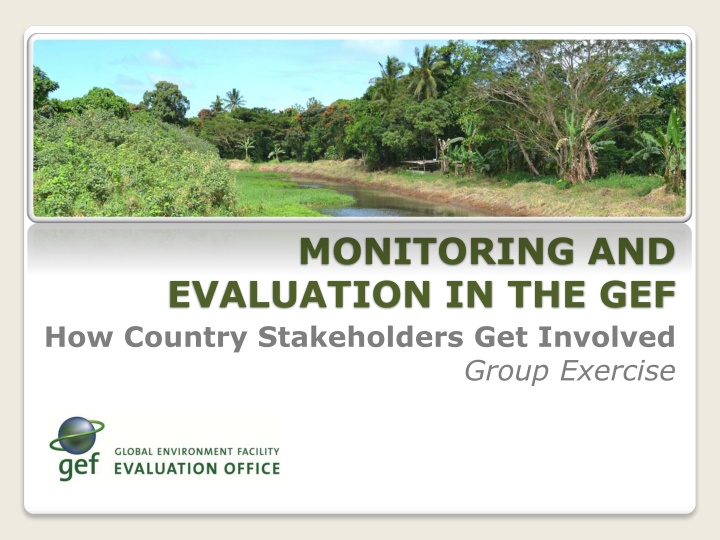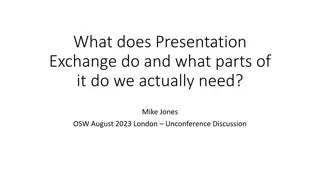
Engagement of Country Stakeholders in GEF Monitoring and Evaluation
This material explores the involvement of country stakeholders in the Global Environment Facility (GEF) monitoring and evaluation processes. It highlights key roles and responsibilities of various partners in monitoring and evaluation activities within the GEF framework. The content emphasizes the importance of promoting accountability, learning, feedback, and knowledge-sharing to improve performance and achieve GEF objectives. Stakeholders such as the GEF Council, GEF Evaluation Office, GEF Secretariat, and participating countries play crucial roles in policy-making, oversight, and implementation of monitoring and evaluation initiatives.
Download Presentation

Please find below an Image/Link to download the presentation.
The content on the website is provided AS IS for your information and personal use only. It may not be sold, licensed, or shared on other websites without obtaining consent from the author. If you encounter any issues during the download, it is possible that the publisher has removed the file from their server.
You are allowed to download the files provided on this website for personal or commercial use, subject to the condition that they are used lawfully. All files are the property of their respective owners.
The content on the website is provided AS IS for your information and personal use only. It may not be sold, licensed, or shared on other websites without obtaining consent from the author.
E N D
Presentation Transcript
MONITORING AND EVALUATION IN THE GEF How Country Stakeholders Get Involved Group Exercise
Overview Monitoring and evaluation in the GEF Key roles and responsibilities GEF Evaluation Office The GEF M&E Policy Practical Exercise
M&E in the GEF TWO OVERARCHING OBJECTIVES: Promote accountability for the achievement of GEF objectives through the assessment of results, effectiveness, processes, and performance of the partners involved in GEF activities Promote learning, feedback, and knowledge-sharing on results and lessons learned among the GEF and its partners as a basis for decision-making on policies, strategies, program management, programs, and projects; and to improve knowledge and performance
Partner Key Roles and Responsibilities in M&E Policy-making Oversight Enabling environment for M&E GEF Council Independent GEF evaluation Oversight of M&E Setting minimum requirements for evaluation GEF Evaluation Office GEF Results Based Management (monitoring and reporting) Review of GEF M&E requirements in project proposals GEF Secretariat Agency GEF operational units Monitoring of the Agency GEF portfolio Ensure M&E at the project level Agency evaluation units Project and/or corporate Agency evaluations Mainstreaming GEF into relevant Agency evaluation Advice on scientific/technical matters in M&E Support to scientific and technical indicators STAP Participating Countries Collaboration on M&E at portfolio and project levels Participation in monitoring activities and mechanisms Providing views and perceptions to evaluations Stakeholders
GEF Evaluation Office Mission Enhance global environmental benefits through excellence, independence and partnership in monitoring and evaluation
GEF Evaluation Office in GEF-5 Implementation of the GEF M&E Policy 2010 Annual Reporting to Council: Country-level evaluations (May-June) Performance and Process Issues (May-June) Impact (November) Thematic/Cross-sectoral evaluations (November) Knowledge Sharing Dissemination of lessons Participation in country support program Fifth Overall Performance Study (OPS5) Active Participation in evaluation communities
GEF Evaluation Office in GEF-5 Four streams of evaluative evidence: Country level evaluations: up to 15 during GEF-5 Impact evaluations: International Waters, Climate Change, Biodiversity Performance evaluation: Annual Performance Report, independent process reviews Thematic evaluation: focal area strategies, adaptation, enabling activities
GEF M&E Policy Approved by the GEF Council in November 2010 Sets norms and standards for M&E Contains minimum requirements for M&E of GEF activities, and roles and responsibilities for GEF stakeholders Puts more emphasis on country ownership and the role of the country Focal Points
Practical Exercise Purpose: Better understand country-level M&E activities in the GEF Especially the role of Operational Focal Points and other country stakeholders Discuss practical questions related to design and use of M&E systems in your country
Practical Exercise Groups at each table work as a team Review background material and case study Goal is to advise a newly appointed Operational Focal Point in your country on M&E issues At the end of the exercise, we will discuss the results
Country-level monitoring of GEF portfolio and environmental trends How should GEF country portfolio and environmental monitoring be organized? 1. Who should coordinate GEF portfolio monitoring the Ministry of Environment, the Ministry of Finance, the OFP and its office, the GEF Agencies, or another entity? What kinds of data would be most important to track? Are there any existing sources of information or data systems that can be used? How can data from projects be integrated into national data systems? Who should this information be shared with? What mechanisms for sharing information will be used?
Involvement of OFP in evaluation 2. How can the OFP get involved in M&E activities? What GEF-related evaluation activities should the OFP be informed of? How can the OFP get involved in GEF midterm and terminal evaluations? How can the OFP get involved in GEF country-level evaluations and studies? How should the findings from these evaluation activities be used by the OFP? Who should they be shared with?
Involvement of OFP in evaluation 3. How can the OFP provide feedback to the evaluation s terms of reference? What would be the most important parameters to provide feedback on?
National coordinating mechanism of M&E 4. Should there be a national coordinating mechanism for M&E? How should it be built?
Reflections on learning One thing you learned in this session A key thought or piece of advice that will guide your future involvement in M&E A question to ponder
Thank you gefevaluation@thegef.org www.gefeo.org






















